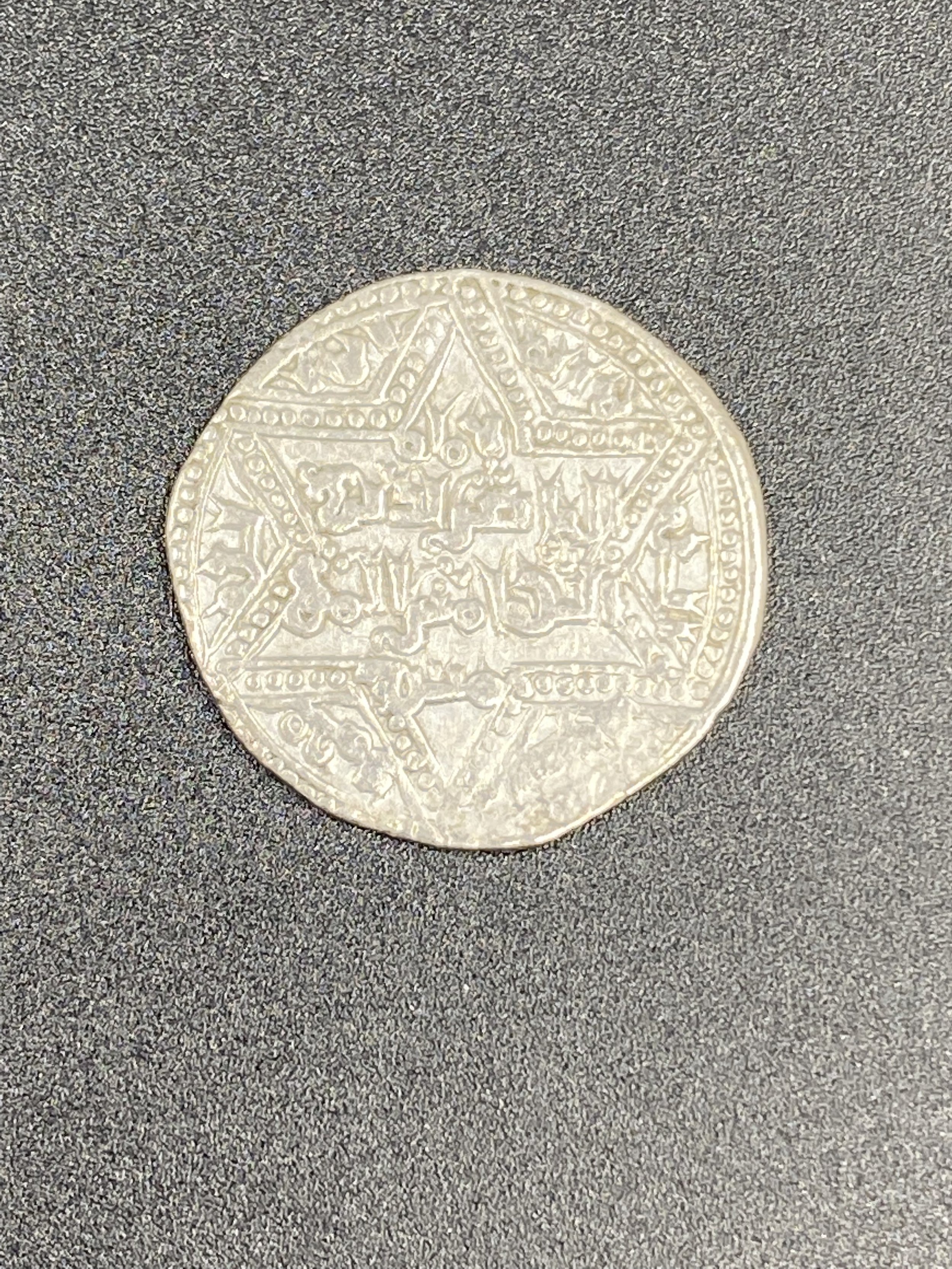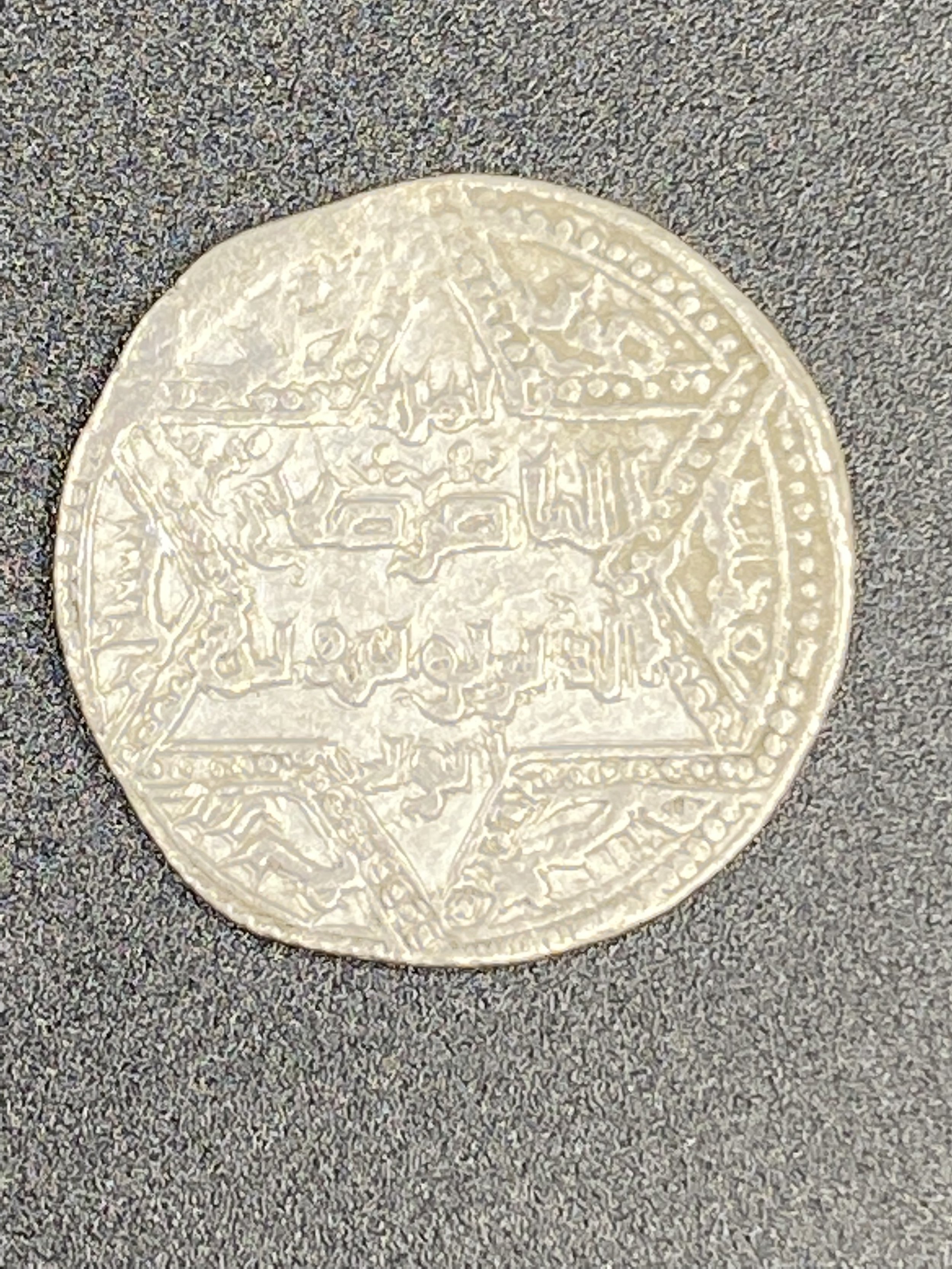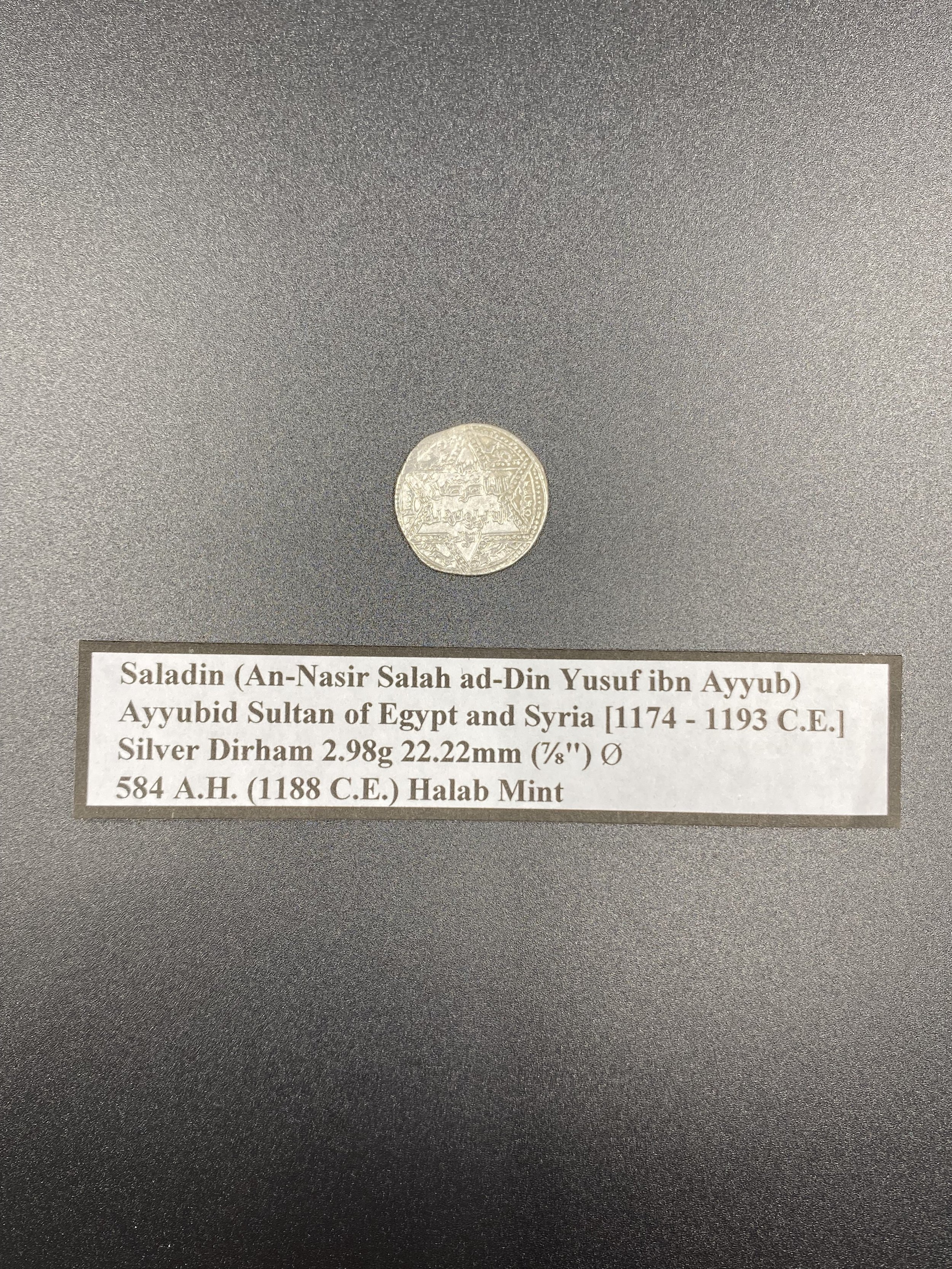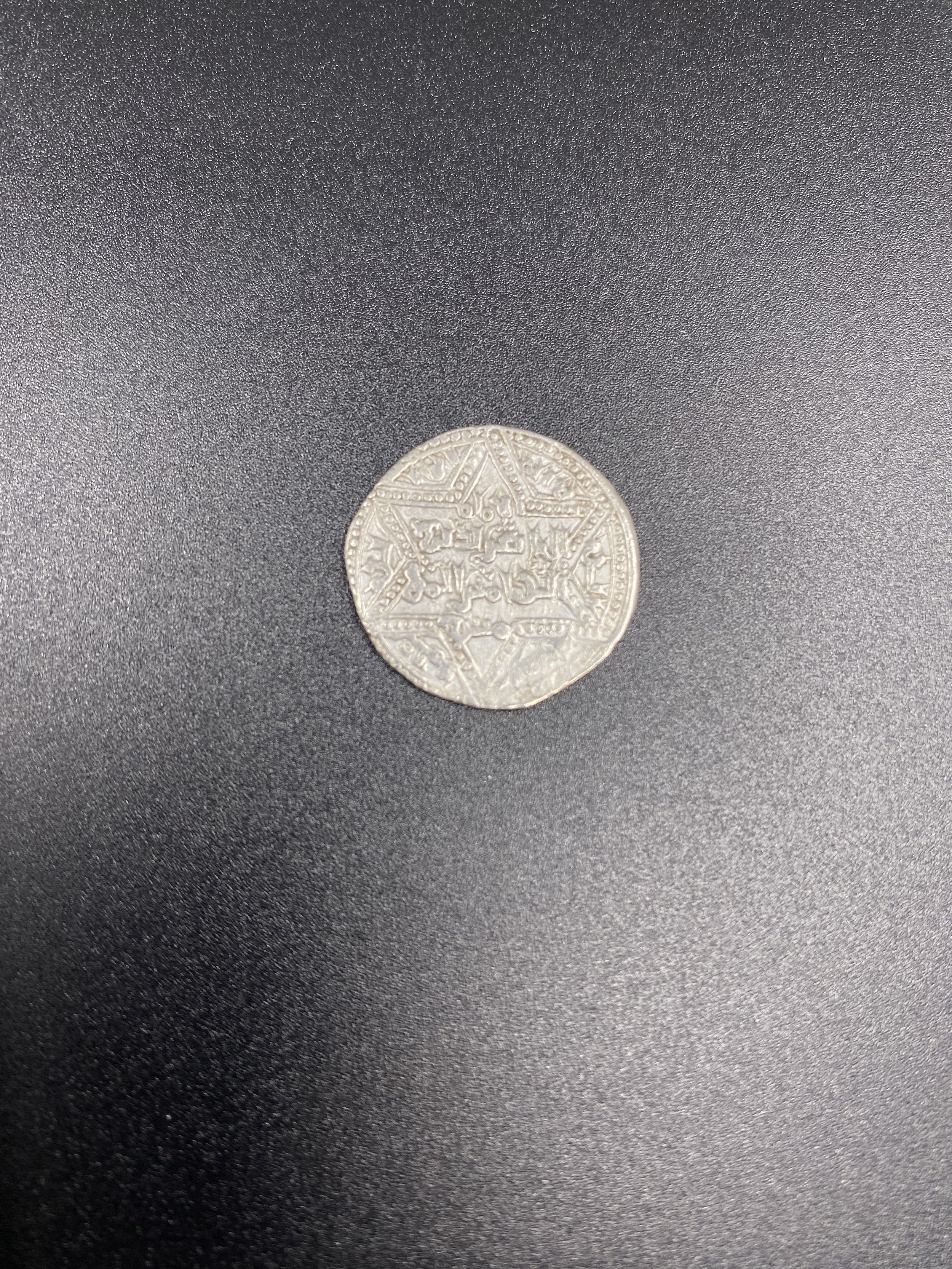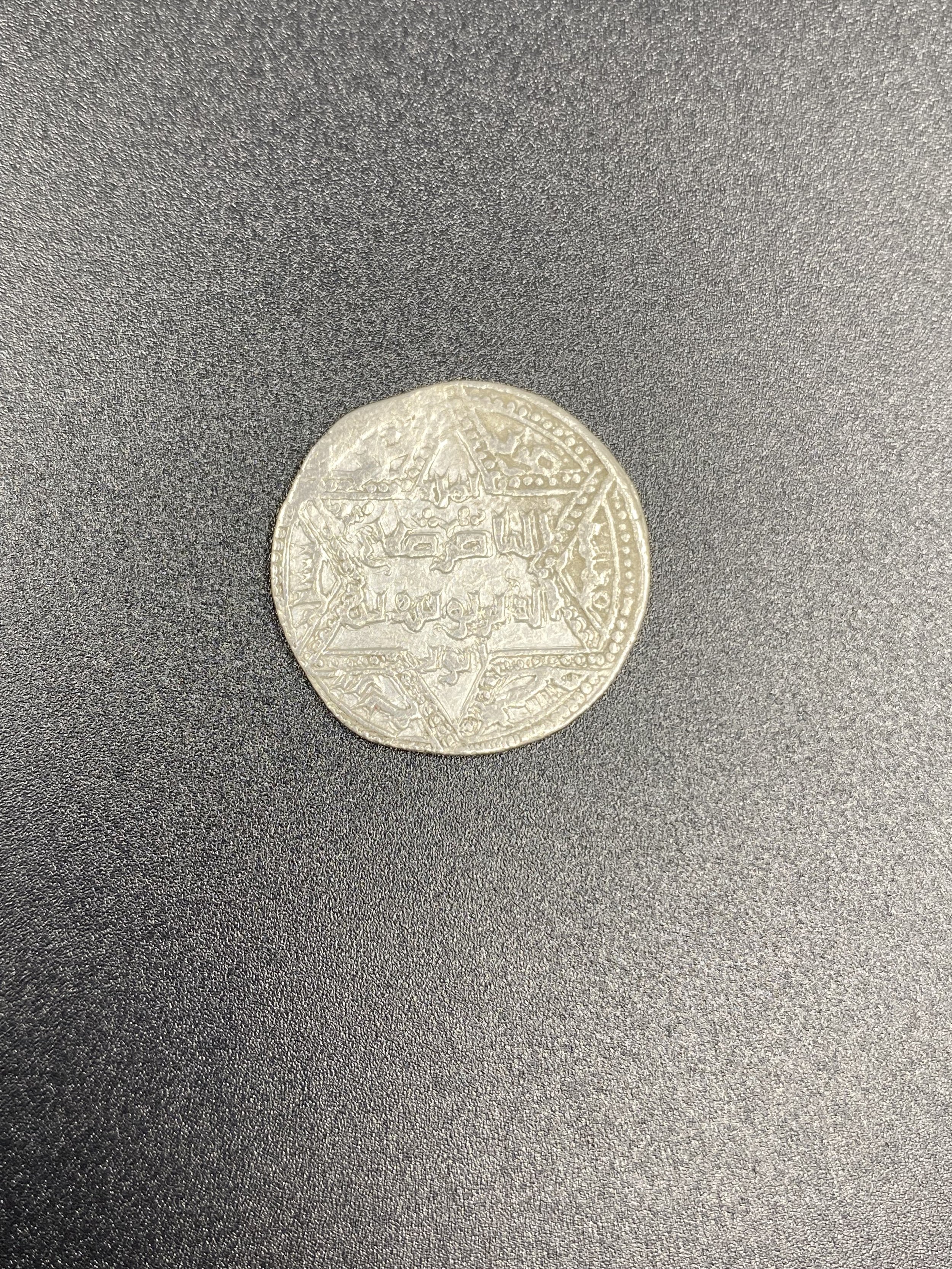Saladin Silver Dirham
Saladin (An-Nasir Salah ad-Din Yusuf ibn Ayyub)
Ayyubid Sultan of Egypt and Syria [1137 - 1193 C.E.]
Silver Dirham 2.98g 22.22mm (⅞") Ø
584 A.H. (1188 C.E.) Halab Mint
Al-Nasir Salah al-Din Yusuf ibn Ayyub (Kurdish: سەالحەدینی الناصر صالح الدين يوسف :Arabic; Eyûbî Selahedînê: romanized, ئەییووبی أيوب بن ,romanized: an-Nāṣir Ṣalāḥ ad-Dīn Yūsuf ibn Ayyūb; (1137 – March 4th 1193 C.E.), better known simply as Salah ad-Din or Saladin (/ˈsælədɪn/), was a Sunni Muslim Kurd born in Tikrit (of modern day Iraq) who became the first Sultan of both Egypt and Syria, founding the Ayyubid dynasty. Saladin led the Muslim military campaign against the Crusader states in the Levant. At the height of his power, his sultanate spanned Egypt, Syria, the Jazira (Upper Mesopotamia), the Hejaz (western Arabia), Yemen, parts of western North Africa, and Nubia. All that remained in the possession of Saladin at the time of his death were one piece of gold and forty pieces of silver. For, he had given away his great wealth to his poor subjects, leaving nothing to pay for his funeral. He was buried in a mausoleum in the garden outside the Umayyad Mosque in Damascus. Saladin had achieved a great reputation in Europe as a chivalrous knight, due to his fierce struggle against the crusaders and his generosity. The Eagle of Saladin continues as a powerful symbol in the coat of arms of the Kurdistan Regional Government. This coin can be considered as a potent talisman infused with the energies of the most renowned Kurd of all time.
Saladin (An-Nasir Salah ad-Din Yusuf ibn Ayyub)
Ayyubid Sultan of Egypt and Syria [1137 - 1193 C.E.]
Silver Dirham 2.98g 22.22mm (⅞") Ø
584 A.H. (1188 C.E.) Halab Mint
Al-Nasir Salah al-Din Yusuf ibn Ayyub (Kurdish: سەالحەدینی الناصر صالح الدين يوسف :Arabic; Eyûbî Selahedînê: romanized, ئەییووبی أيوب بن ,romanized: an-Nāṣir Ṣalāḥ ad-Dīn Yūsuf ibn Ayyūb; (1137 – March 4th 1193 C.E.), better known simply as Salah ad-Din or Saladin (/ˈsælədɪn/), was a Sunni Muslim Kurd born in Tikrit (of modern day Iraq) who became the first Sultan of both Egypt and Syria, founding the Ayyubid dynasty. Saladin led the Muslim military campaign against the Crusader states in the Levant. At the height of his power, his sultanate spanned Egypt, Syria, the Jazira (Upper Mesopotamia), the Hejaz (western Arabia), Yemen, parts of western North Africa, and Nubia. All that remained in the possession of Saladin at the time of his death were one piece of gold and forty pieces of silver. For, he had given away his great wealth to his poor subjects, leaving nothing to pay for his funeral. He was buried in a mausoleum in the garden outside the Umayyad Mosque in Damascus. Saladin had achieved a great reputation in Europe as a chivalrous knight, due to his fierce struggle against the crusaders and his generosity. The Eagle of Saladin continues as a powerful symbol in the coat of arms of the Kurdistan Regional Government. This coin can be considered as a potent talisman infused with the energies of the most renowned Kurd of all time.
Saladin (An-Nasir Salah ad-Din Yusuf ibn Ayyub)
Ayyubid Sultan of Egypt and Syria [1137 - 1193 C.E.]
Silver Dirham 2.98g 22.22mm (⅞") Ø
584 A.H. (1188 C.E.) Halab Mint
Al-Nasir Salah al-Din Yusuf ibn Ayyub (Kurdish: سەالحەدینی الناصر صالح الدين يوسف :Arabic; Eyûbî Selahedînê: romanized, ئەییووبی أيوب بن ,romanized: an-Nāṣir Ṣalāḥ ad-Dīn Yūsuf ibn Ayyūb; (1137 – March 4th 1193 C.E.), better known simply as Salah ad-Din or Saladin (/ˈsælədɪn/), was a Sunni Muslim Kurd born in Tikrit (of modern day Iraq) who became the first Sultan of both Egypt and Syria, founding the Ayyubid dynasty. Saladin led the Muslim military campaign against the Crusader states in the Levant. At the height of his power, his sultanate spanned Egypt, Syria, the Jazira (Upper Mesopotamia), the Hejaz (western Arabia), Yemen, parts of western North Africa, and Nubia. All that remained in the possession of Saladin at the time of his death were one piece of gold and forty pieces of silver. For, he had given away his great wealth to his poor subjects, leaving nothing to pay for his funeral. He was buried in a mausoleum in the garden outside the Umayyad Mosque in Damascus. Saladin had achieved a great reputation in Europe as a chivalrous knight, due to his fierce struggle against the crusaders and his generosity. The Eagle of Saladin continues as a powerful symbol in the coat of arms of the Kurdistan Regional Government. This coin can be considered as a potent talisman infused with the energies of the most renowned Kurd of all time.
